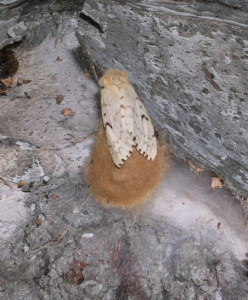
Female gypsy moth lays an egg mass.
As of mid-July, DNR forest health staff have received reports of adult gypsy moths present as far north as Burnett County. The brown-shelled pupae and white female moths can be crushed with a stick. The remaining caterpillars will also pupate soon, and where the caterpillars are a problem, they can be crushed, drowned in soapy water, or sprayed with insecticide or insecticidal soap.
The female gypsy moth can’t fly, so she releases a scent called a pheromone to attract the male. Between mid-July and late August, each female moth will lay a tan-colored egg mass about the size of a nickel or quarter. A new egg mass laid this summer will be hard and feel as though it is full of ball bearings, whereas an old egg mass feels like a dry sponge when pressed. Female moths lay egg masses on trees, houses, firewood piles, old tires and other outdoor objects. Homeowners can be surprised where they find these masses. If a caterpillar can crawl there, you may have an egg mass present.
The eggs can be killed by spraying them with an egg mass oil available at many garden stores, nurseries and hardware stores. Egg masses can also be scraped into a can and then drowned in soapy water for several days before being discarded in the trash. Landowners should not scrape the eggs onto the ground, as they will still hatch next year. Treating the egg masses is a good way to help reduce the population, since you will have 500 to 1,000 fewer caterpillars for every egg mass you oil or remove. Property owners in heavily infested areas should use an egg mass oil or wait until winter to remove egg masses, since communities may sample egg mass numbers this fall to determine whether an area qualifies for aerial spraying.
If you had many nuisance caterpillars in your yard this summer or see many egg masses produced over the next two months, report the infestation to your local community government and express interest in having the area examined for possible inclusion in the DNR gypsy moth suppression program that is run through participating counties. Woodlot owners can usually contact the county government directly. For-hire aerial applicators may also be available to do gypsy moth spraying. More information about gypsy moth and aerial spraying is available online at www.gypsymoth.wi.gov.
Written by: Bill McNee, forest health specialist, Plymouth (Bill.McNee@Wisconsin.gov), 920-893-8543).
